 Page
Page
For more complete information on 19th Century Military Drill, visit the main page.
=============================================
PART IV.
__________
REGULATIONS.
========================================
CONTENTS OF PART FOURTH.
_____________
 Page
Page
PRECEDENCE of regiments and corps…………...............................………………………………............5
Duties in garrison and camp, comprising-
Beats and signals……………………….………………...........……………………………………........5,6
The Roster………………………………………………........................……………………….………..30
Roll calls…………………………………..............................…………………………….………...........31
Daily details and duties…………………………..................………………………………………........31
Dress parade………………………………………………………………………………………………..34
Guard mounting…………………………………………………................……………………………....6
Relieving guards and sentinels……….…...............................…………………………………......…..38
Method of going and receiving the grand round...........………….……………………………….........40
Guards, their use and duty………….......................................……………………………………........2
Order of encampment for Infantry................................................……………….………………………….....50
_________________________Cavalry……………………………….………………………………………….52
_________________________Artillery…………………………………………………………………………..53
Honours to be paid by the troops………………………………………………………………………………….58
________________________________Salutes………………………………………………………………..58
________________________________Escorts of Honour…………………………………………………...58
________________________________Funeral Honours…..………………………………………………...59
Colour escort…………………………………………………………..…………………………………………….60
Review………………………….…………………………………………………………………………………….61
Inspection……………….........................................................…………………….………………….........…..65
Calling out the militia for the service of the U.S….....................……………………………………................68
Manner of issuing and distributing orders....................................………………………………………..........69

PART
IV.
_________
REGULATIONS
_________
PRECEDENCE OF REGIMENTS AND CORPS.
The precedence of regiments and corps is as follows:- 1st. The Light Artillery - 2d. The Light Dragoons - 3d. Other Regular Cavalry - 4th. The Artillery - 5th. The Infantry - 6th. The Marine Corps - 7th. The Riflemen - 8th. Volunteer Corps - 9th. The Militia.
Regiments of the regular army will take precedence in their particular arm, according to numerical order - in the volunteers and militia, by lot.
This order of precedence refers to parades. On all other occasions, the several regiments and corps are to be distributed and drawn up as the commanding officer may judge best adapted to the purposes of the service.
DUTIES IN GARRISON AND CAMP.
The duties in garrison and camp are to be conducted, as far as practicable, in the same manner, and on the same principles.
The Reveille is to sound or beat at day-break, and is the signal for the men to rise, and the sentinels to leave off challenging.
The Troop is to sound or beat at __ o’clock in the morning, for the purpose of assembling the men for duty and inspection at guard-mounting.
The Retreat is to sound or beat at sunset, for the purpose of warning the officers and men for duty, and for reading the orders of the day.
The Tattoo is to sound or beat at __ o’clock, after which no soldier is to be out of his tent or quarters.
Peas-upon-a-trencher, the signal for breakfast, is to sound or beat at __ o’clock in the morning.
Roast-beef, the signal for dinner, is to sound or beat at __ o’clock; at other times, it is the signal to draw provisions.
PART IV. REGULATIONS.
The Surgeon’s Call is to sound or beat at __o’clock, when the sick, able to go out, will be conducted to the hospital by the First Sergeants of companies, who will hand to the surgeon a report of all the sick in the company, other than those in hospital.
The General, is to beat only when the whole army is to march, and is the signal to strike the tents, and prepare for the march.
The Assembly is the signal to form by company.
To the Colour is the signal to form by battalion.
The March for the whole to move.
The Long Roll is the signal for getting under arms, in case of alarm, or the sudden approach of the enemy.
The Parley is to desire a conference with the enemy.
The Stable Call, in cavalry troops, will be sounded immediately after reveille, forty minutes before noon, and again, immediately after retreat, for watering, feeding, and attending to the horses.
Signals.
To go for fuel- poing stoke and ten stroke roll.
To go for water- two strokes and a flam.
For fatigue party- pioneer’s march.
Adjutant’s call- first part of the troop.
First Sergeants’ call- one roll and four taps.
Sergeants’ call- one roll and three taps.
Corporals’ call- one roll and two taps.
For the drummers- the drummers call.
The different daily beats shall be given on the right, and be immediately followed by the whole army; to facilitate which, the drummers’ call shall be beat by the drums of the police a quarter hour before the time of beating, when the drummers will assemble before the colours of their respective regiments; and as soon as the beat begins on the right, it will be immediately taken up by the whole army, the drummers beating along the front of their respective regiments, from the centre to the right, thence to the left, and back again to the centre, where they finish. Where the hours for the different beats and signals are not fixed, the commanding officer will establish them, having regard to climate and circumstance.

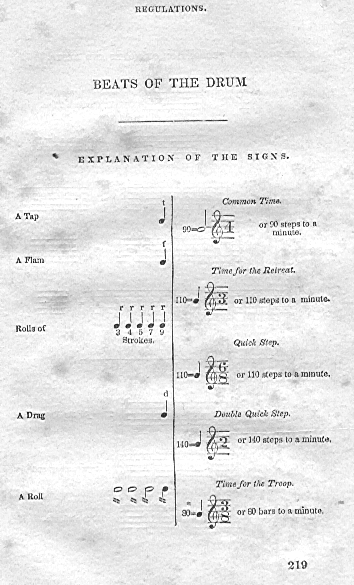

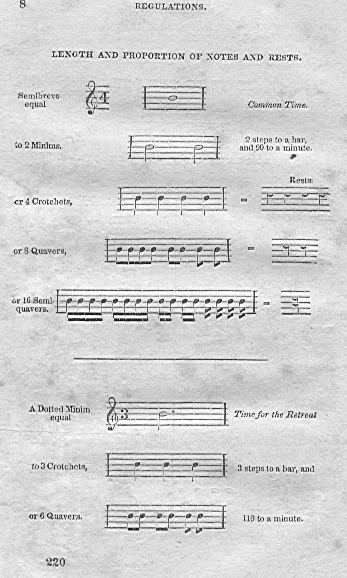

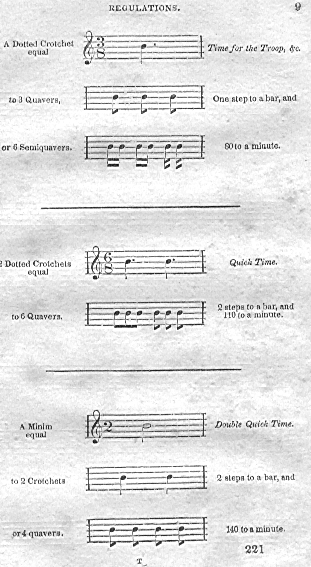

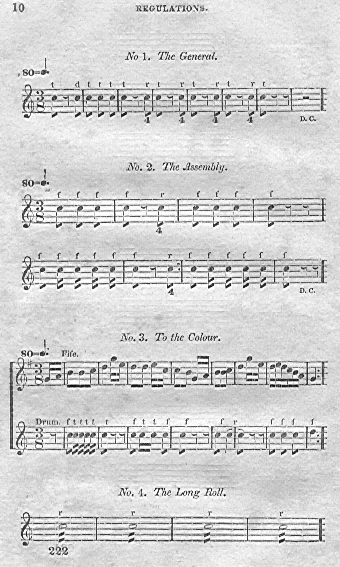

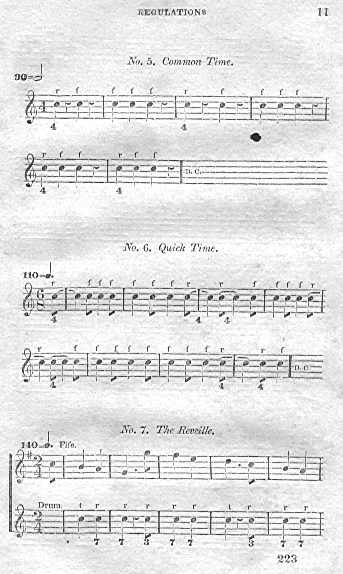

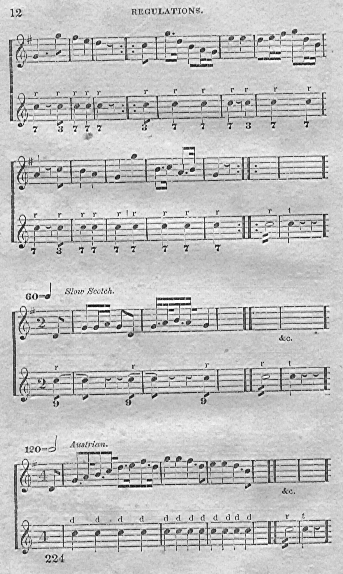

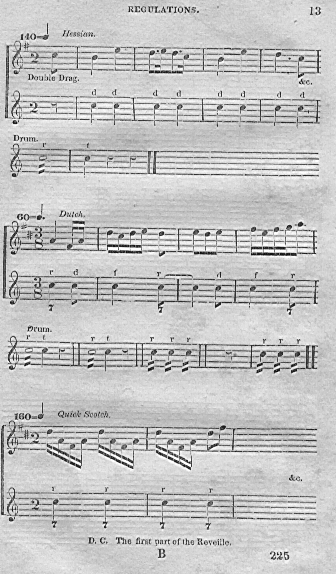

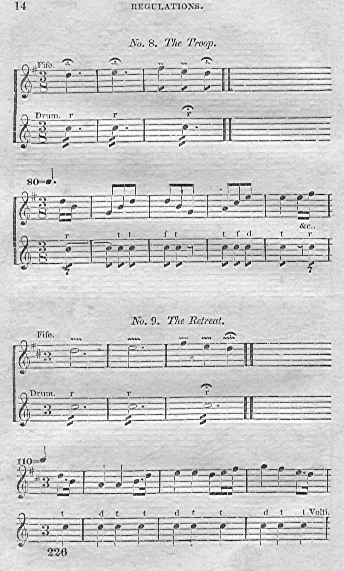

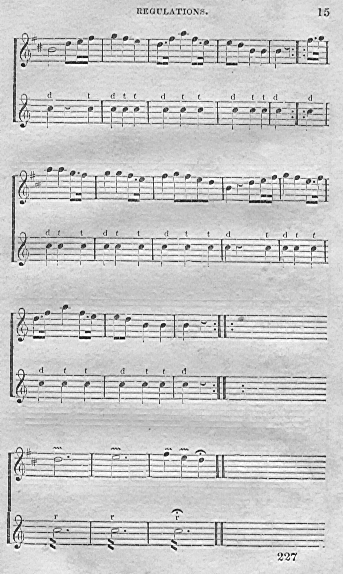

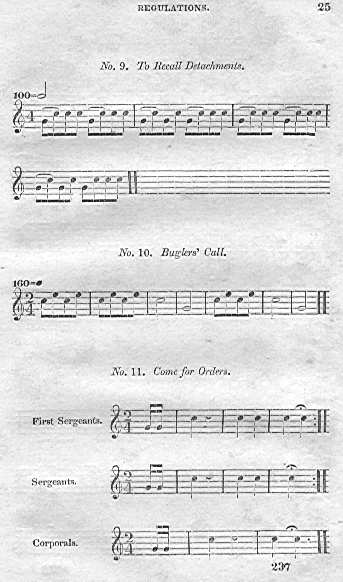

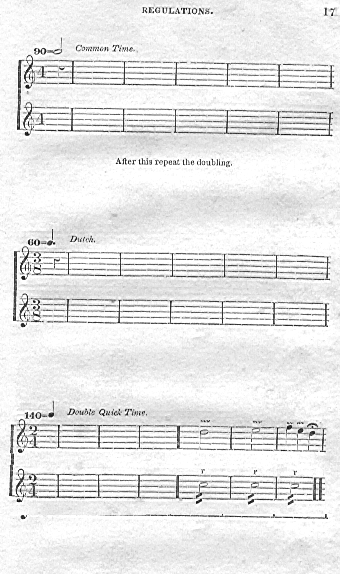

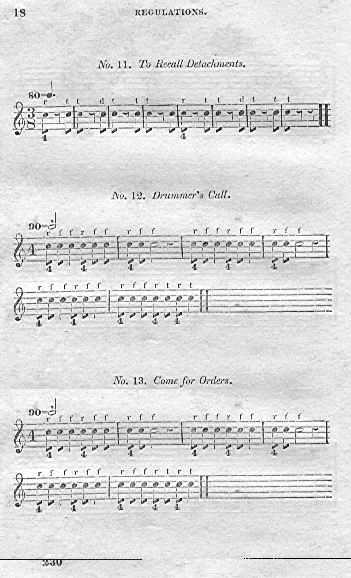

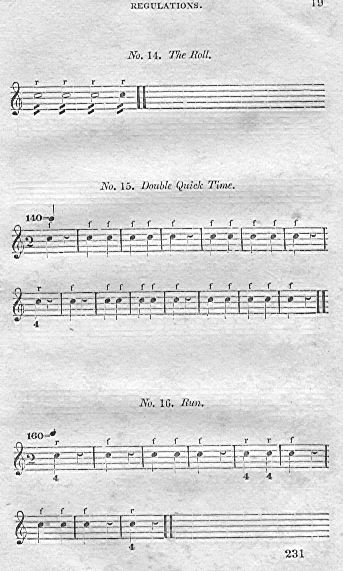

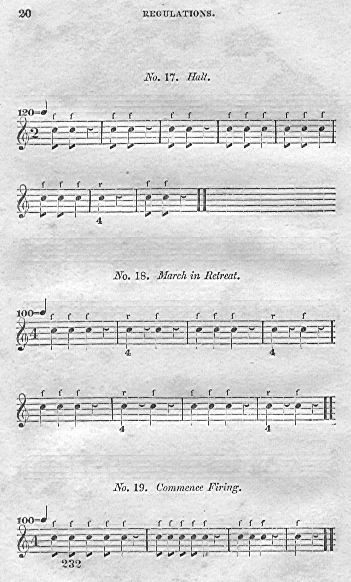

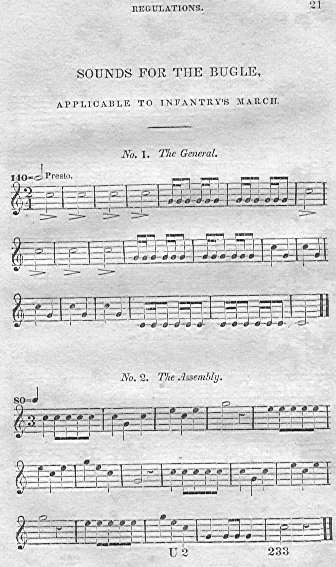

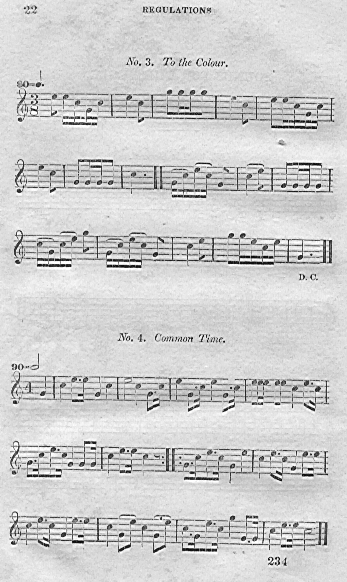

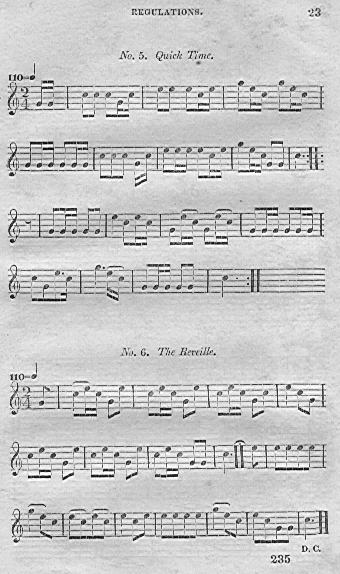

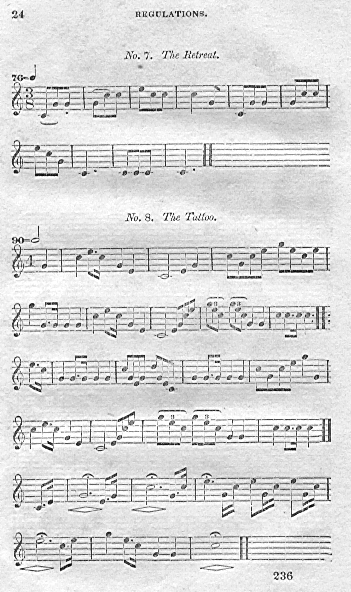



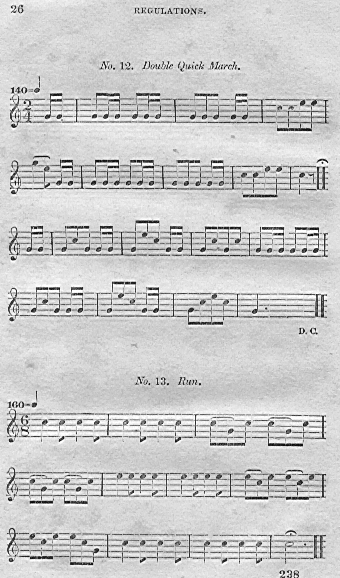

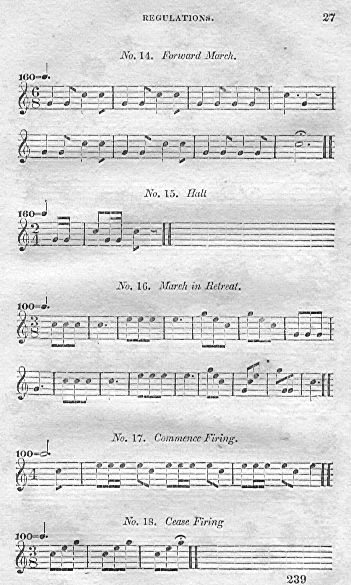

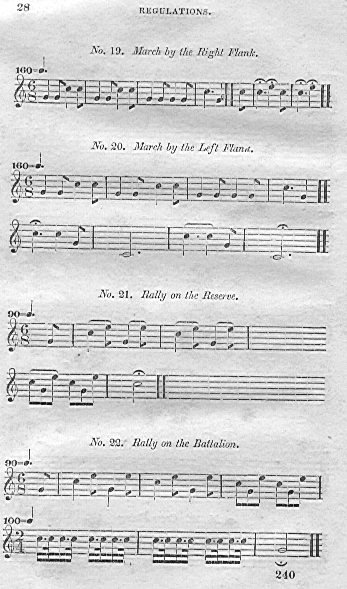

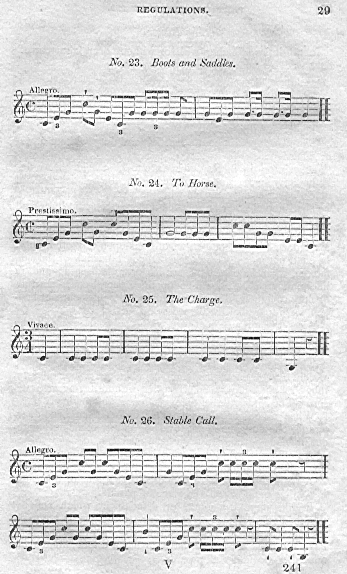

PART IV. REGULATIONS.
The Roster.
In all duties, whether with or without arms, the tour of duty shall be from the eldest downwards.
Of duties-
The first is, detachments of the army or outposts.
The second, general officers’ guards, according to rank.
The third, the ordinary guards, in camp or garrison.
The fourth, the pickets.
The fifth, general courts martial, and duty without arms or of fatigue.
Officers on the inlying picket are to be considered as liable to be relieved and employed upon other duties. If an officer’s tour of duty happen when he is on the inlying picket, he shall immediately be relieved and go upon that duty, and his tour upon the picket credited to him.
If an officer’s tour of duty for the picket, general court martial, or fatigue happen when he is upon any other duty, he shall not make good that picket, court martial, or duty of fatigue, when he comes off, but his tour shall pass; and, in like manner, if he should be upon a general court martial, or duty of fatigue, and his tour of guard or detachment happen, such tour shall be passed to his credit.
After the adjournment sine die, of a court martial, the members will return to their respective corps and duties, unless otherwise ordered.
The session of a general court martial, the members of which have been sworn, shall be reckoned a tour of duty, though it shall have been adjourned without trying any person. The same rule will apply to courts of inquiry.
When a officer is designated in orders from head quarters for one duty, he is not to be put on any other duty without previous permission from head quarters.
An officer is not to exchange duties with another, without leave of the commanding officer of his regiment or post.
A regiment is not to receive credit for a tour of duty, unless it has marched off the place of parade.
In like manner a guard or detachment which has not marched off the place of parade or rendezvous, is not to be reckoned as having performed a tour of duty; but if it shall have marched off, it shall have credit for a tour, though dismissed immediately afterwards.

PART IV. REGULATIONS.
When a picket is ordered to march to any parade, it is not to be accounted as having performed a tour of duty, unless it shall have marched off that parade.
Roll Calls.
There shall be daily at least five stated roll calls.
The first, immediately after reveille.
The second, immediately before breakfast.
The third, immediately before dinner.
The fourth, immediately before retreat.
The fifth, immediately after tattoo.
The first, fourth, and fifth, roll calls will be made on the company parades by the First Sergeants, superintended by an officer; the second and third roll calls will be made by the First Sergeant, or by the non-commissioned officers of squads, at their respective messes, and reported by them to the First Sergeants, who will immediately report the result to the Captains, and if at any of the roll calls men are absent without leave, or cannot be found, the Captains will report the names of the absentees to the Adjutant, for the information of the Colonel or commanding officer.
Immediately after reveille roll call, the tents or quarters and the space around them will be put in complete order by the men of the companies, superintended by the chiefs of squads. The same rule will be observed at the guard-house or guard-tent, by the guard or prisoners.
The morning reports of companies, signed by the Captains and First Sergeants, will be handed to the Adjutant before eight o’clock in the morning, and will be consolidated by the Adjutant within the next hour, for the information of the Colonel; and if the consolidation if to be sent to higher authority, it will be signed by the Colonel and the Adjutant.
Daily Details and Duties.
The daily duty must be announced in orders, and the officers to perform it are to be detailed according to the rules of the roster.
The number and rank of the officers for daily duty, are to be regulated by the strength and circumstances of the camp or garrison.
Independently of the officers detailed for guard duty, the officers for daily duty will be as follows:

PART IV. REGULATIONS.
In large camps there will be a general officer of the day for each division; a field officer of the day for each brigade; a captain of the day for each regiment; and such general and regimental staff officers of the day as may be necessary to attend to the various details, and to receive and execute orders according to their respective stations. In every regiment and garrison, besides the officer of the day, there will be detailed daily, if the strength of the garrison will permit, a subaltern, four non-commissioned officers, a drummer, and such fatigue parties as circumstances may require, for the police of the regiment or garrison. In small commands, subalterns may be detailed for duty as officers of the day, and they will discharge the duties of officers of police. The officers thus detailed are to remain in camp during their tours of duty.
The General of the day is to superintend the regularity and discipline of the camp in every particular; he is to visit the guards of the camp and the outposts; he is to call out and inspect the inlying pickets as often and at such times as he thinks proper; he is to receive all reports in camp, and make immediate communication of any extraordinary circumstance to the General-in-Chief.
The field officer of the day has the immediate superintendence of the camp of the brigade; he is to be present at the mounting and dismounting of all the brigade guards, particularly of the inlying pickets, which are always considered under his command; he is to call them out to inspect them, to order such parades from them as he may judge necessary to insure the regularity and order of the camp, and in the event of the inlying pickets being ordered to march, he is to march with them.
The Captain or subaltern of the day of each regiment, superintends the cleanliness and regularity of the camp or quarters of the regiment; he attends the parading of all regimental guards, and orders the roll to be called frequently and at unexpected periods, and reports everything extraordinary to the commending officer; he is to visit the hospital at various hours, and make a report of its state to the commanding officer of the regiment or garrison.
The Adjutant of the day of the brigade, is to assist the general staff officer of the day, in the various details of it,

PART IV. REGULATIONS.
and, in his absence, to perform his duty as such, and attend for orders at head quarters.
The officer of police, under the direction of the officer of the day, is to make a general inspection into the cleanliness of the camp or garrison; to suffer no fires to be made in camp, except in the kitchens; to cause all dirt of filth to be immediately removed, and either burnt or buried; to be present at all distributions of the regiment, and to form and send all detachments for necessaries. In case the Adjutant is obliged to be absent, the officer of police is to do his duty until his return; for which purpose he must attend at the Adjutant’s tent or office, to be ready to receive and distribute any orders that may come for the regiment. The drummer of the police must attend constantly at the Adjutant’s tent or office, to be ready at all times to communicate the necessary signals; nor must he absent himself on any account, during the twenty-four hours, without leaving another drummer to supply his place until his return; nor then without leave from the Adjutant. In camp, when water is required by the men, application must be made to the officer of police, who will order the drummer to beat the necessary signal, on which, all who want water, must immediately parade with their canteens before the colors, where the officer of police will form and send them off under the care of two non-commissioned officers of the police, who are to be answerable that the whole party is brought back, and that no excesses are committed while it is out. Wood and other necessaries must be sent for and brought to camp in the same manner. Except in cases of necessity, not more than one detachment is to be absent at a time.
Every such party not conducted by a non-commissioned officer shall have a written permission form a field officer, of officer commanding a regiment, or the officer of police, without which it is not to be permitted to pass the chain.
No non-commissioned officer or soldier is to quit camp or garrison without a pass signed by the commanding officer of the regiment or garrison, or by the Adjutant, under the authority of the commanding officer,
No officer is on any account to sleep out of camp or garrison, without permission.

PART IV. REGULATIONS.
Dress Parade.
There shall be daily at least one dress parade, which may be either at troop or retreat, as the commanding officer may direct; or at both beats, should he think proper so to order. The parade at troop will be termed the morning parade, and that at retreat, the evening parade. In either case, it will be conducted as follows:
A signal will be beat or sounded half an hour before troop or retreat, for the music to assemble on the regimental parade. At the same time, each company will turn out under arms, on its own parade, for roll call and inspection by its own officers.
Ten minutes after that signal, the Adjutant’s call will be given, when the companies will be marched (the band playing) to the regimental parade, where they will be formed in their relative positions in the order of battle, arms ordered and at rest: the officers at their posts with swords drawn, the Adjutant on the right of the line. The music will be formed in two ranks on the right of the Adjutant, and from the Adjutant’s call to troop or retreat, the band will play. The senior officer present will take command of the parade, and will take a post at a suitable distance in front opposite the centre, facing the line.
Ten minutes after the Adjutant’s call, the Adjutant will order the music to beat off, when it will commence on the right, beat in front of the line to the left, and back to its place on the right.
When the music has ceased, the Adjutant will step two paces to the front, face the line, and command- Attention. Shoulder-arms. Prepare to open ranks. To the rear, open order. March. Right- dress.
The ranks will be opened according to the system laid down in the Infantry Tactics, the commissioned officers marching to the front, the company officers four paces, field officers six paces, opposite to their positions in order in line of battle, where they will halt and dress. The Adjutant seeing the ranks aligned, will command front, and march along the front to the centre, face to the right, and pass the line of company officers eight or ten paces, where he will come to the right-about and give the words, present-arms, when arms will be presented, officers saluting,

PART IV. REGULATIONS.
Seeing this executed, he will then face about to the commanding officer, salute, and report, “the parade is formed.” The Adjutant will then, on intimation to that effect, take his station on the left of the commanding officer, one pace retired, passing around his rear.
The commanding officer having acknowledged the salute of the line by touching his hat, will, after the Adjutant has taken his post, draw his sword and command- SHOULDER- ARMS; and add such exercises as he may think proper, concluding with- ORDER- ARMS.
The Adjutant will now pass round the right of the commanding officer, advance upon the line, halt midway between him and the line of company officers, and command- First Sergeants, to the front and centre. March. At the words front and centre, the sergeants named will shoulder arms as sergeants, march two paces to the front, and face inwards. At the word march, they will march to the centre and halt. The Adjutant will then order- Front-face. Report. At the last word, each in succession, beginning on the right, will report the result of the roll call previously made on the company parade.
The Adjutant again commands- First Sergeants, outward-face. To your posts-march; when they will resume their places and order arms. The Adjutant will now face to the commanding officer, salute, and give the result of the first sergeants’ reports. The commanding officer then directs the orders to be read, when the Adjutant will face about, give the words Attention to orders- and then read the orders.
The orders having been read, the Adjutant will face to the commanding officer, salute, and report, when, on an intimation from the commander, he will face again to the line, and announce, the parade is dismissed. All the officers will now return their swords, face inwards, and close on the Adjutant, the field officers on the flanks. The Adjutant gives the words- Front-face. Forward-march; when they will march forward, the music playing, and when within six paces of the commander, the Adjutant will give the word halt. The officers will then salute the commanding officer by raising the hand to the cap, and there remain until he shall have communicated to them such instructions as ha may have to give, or intimates that the ceremony is finished. As the officers disperse, the First Sergeants will close the

PART IV. REGULATIONS.
ranks of their respective companies, and march them to the company parades, where they will be dismissed, the band continuing to play until the companies clear the regimental parade.
All company officers and men will be present at dress parade, unless specifically excused, or on some duty incompatible with such attendance.
Guard Mounting.
Thirty minutes before guard mounting, a call will be sounded for the men warned for duty, to turn out on their company parades for inspection by the First Sergeants, superintended by an officer of each company. Ten minutes after, a second call will be sounded for the duty men to repair to the regimental or garrison parade, conducted by the First Sergeants. Each detachment as it arrives, will take post on the left of the one that preceded it, under the direction of the Adjutant, in open order, arms shouldered, and bayonets fixed; the supernumeraries five paces in the rear of the men of their respective companies. If the guards are intended for the grand parade, they will be marched thither by the senior officer of the details, where they will take post in the order prescribed above, under the direction of the general staff officer, or his assistant, the Adjutant of the day.
The following regulations respecting mounting guards, are drawn up with reference to the grand parade; with a few obvious variations, they will equally apply to regimental or garrison parade.
The ranks being opened, the officers of guards will take post twelve paces in front of the centre, in one line, according to rank, and with swords drawn: the Sergeants in one rank, four paces in the rear of the officers, and the Corporals in one rank, four paces in the rear of the Sergeants; the whole facing to the front.
The Adjutant of the day, will dress the lines, count the files, verify the details by reference to the written orders, and tell off the guards, whilst the general staff officer appoints the officers and non-commissioned officers to the several guards, and designates the posts which they are to occupy.
The staff officer will then command- officers and non

PART IV. REGULATIONS.
Commissioned officers. About- face. Inspect your guards. March. The commander of each guard then commands- Order- arms. Inspection of arms. The two highest in ranks of each guard will divide the ranks between them, accompanied by the other officers, and inspect accordingly. During the inspection, the band will play.
The inspection ended, the officers and non-commissioned officers will take their post in their respective guards, as though each guard were a company of a battalion, in open order, under review; at which time, also, the officers’ of the day will take post in front of the centre of the guards; the old officer of the day on the right of the new officer of the day, one pace retired.
The staff officer will now command- rest, troop, beat off; when the music, beginning on the right, will beat down the line in front the officers of the guards to the left, and back to its place on the right, where it will cease to play.
The staff officer continues,- Attention. Shoulder- arms. Close order- march. Present- arms: at which he will face to the new officer of the day, salute, and report, “the guards are formed.” The new officer of the day, after acknowledging the salute, will give the necessary instructions to the staff officer, who will cause the same to be executed, the staff officer giving the word of command.
The guard having shouldered arms and performed such exercises as may be required by the officer of the day, the staff officer will again command,- By guards (or platoon.) Right wheel- march. Pass in review. Column- forward, guide right- march: when the whole will march past the officer of the day, according to the order of review, conducted by the staff officer, marching on the left of the first division; the Adjutant of the day on the left of the last division.
When the column has passed the officer of the day, the guards will break off under their respective commanders, and take the route to the several posts assigned them, the staff officers breaking off at the same time; the music will cease, and the old officer of the day salute, and give the old or standing orders to the new officer of the day. The supernumeraries at the same time, will be marched by the First Sergeants to their respective company parades, and dismissed.
Guards which are assigned to new posts will be conducted

PART IV. REGULATIONS.
to and established in them by the officer of the day and the staff officer detached from head quarters for the purpose.
The officer of the day will always be present at guard mounting. No other officer, except a general officer, will interfere with, or give any order on the parade to the staff officer on duty there. The commander of the troops or garrison, though under the rank of General, is of course an exception to this rule.
The regiment that furnishes the Adjutant of the day will also furnish the music for the grand parade.
Officers on all duties under arms are to have their swords drawn, without waiting for any words of command for that purpose.
Relieving Guards and Sentinels.
The guards in camp and garrison will be relieved every twenty-four hours. The guards at the outposts will ordinarily be relieved in the same manner; but this must depend on their distance from camp, or other circumstances which may sometimes require their continuing on duty several days. In such cases, they must be previously notified to provide themselves accordingly.
The guards are to move in the greatest order to their respective posts, marching by platoon where the roads will permit.
The officer of the old guard, having his guard paraded, on the approach of the new guard, commands- present-arms.
The new guard will march past the old guard, at shouldered arms, officers saluting, and take post three or four paces on its right, and in a line with it, where its officer will command- present- arms. The two officers will then approach each other, and the relieving officer will take his orders from the relieved. Both officers will then return to their respective guards, and command- shoulder-arms.
The officers of the new guard will now direct his Sergeant to make a list of the guard, dividing them into three reliefs, and proceed himself to take possession of the guard-house, or guard-tent, and the article and prisoners in the charge of the guard; he will note every new injury which may have been committed, and, on his report, the relieved officer will be held responsible.

PART IV. REGULATIONS.
The officer of the old guard will have prepared for the signature of the officer who relieves him, an inventory of the property of article in charge of the guard, and also, a roll of the prisoners with their offenses annexed.
The first relief having been designated, the officer of the new guard will order it two paces to the front, when the Corporal of the new guard will take charge of it and go to relieve the sentinels, accompanied by the Corporal of the old guard, who will take command of the old sentinels when the whole are relieved.
If the sentinels are numerous, the Sergeants are to be employed as well as the Corporals, in relieving them.
During the time of relieving the sentinels, and of calling in the small posts, the commanders of the two guards, will, when near the enemy, visit the avenues leading to the post; the old commander giving to the new, all the information which he may possess relative to the position of the enemy.
A relief, with arms supported and formed in two ranks, will march by a flank, conducted by the Corporal on the side of the leading front-rank man.
The sentinels at the guard-hose or guard-tent will be the first relieved and left behind; the one most distant will be the next relieved, and the others in succession, as the relief returns to the guard.
When a sentinel sees the relief approach, he will face to it, and halt. At six paces the Corporal will command- relief-halt: when the relief will halt and carry arms. The Corporal will then add, “No. 1,” or “No. 2,” or “No. 3,” according to the designation of the sentinel- arms- port. At this word, the two sentinels will arms port, and approach each other, when the old sentinel, under the direction of the Corporal, and in his hearing, will whisper the instructions to the new sentinel.
This done, the two sentinels will shoulder arms, and the old sentinel will pass in quick time to his place in rear of the relief, the new sentinel facing the relief. The Corporal will then command- relief, support- arms. Forward- march: and the relief proceeds in the same manner until the whole are relieved.
A relief is always to be marched in the greatest order, at support arms; and if an officer approach, the Corporal is to order his men to carry- arms, supporting them again when

PART IV. REGULATIONS.
the officer has passed. The Corporals are to be answerable that the sentinels, when relieving, perform their motions in the greatest spirit and exactness.
The detachments and sentinels from the old guard having rejoined it, it will take up the march, the music of both guards beating a march, except at the outposts, where the music is prohibited. The old guard will march along the front of the new guard, with shouldered arms: the new guard at presented arms: officers of both guards saluting.
On arriving at the camp or post, the commander of the old guard will, if it consist of detachments of different regiments, send each detachment to its own regiment, under an officer or non-commissioned officer; unless the officer of the day should be present to inspect the old guard, when he will order the men to their several regiments, under their respective officers. In either case, the pieces of the men will be drawn or discharged at a target, before the men are dismissed.
When the old guard has marched off fifty paces, the officer of the new guard will order his men to stack their arms, or to place them in the arm-racks.
The commanding officer of the guard will then make himself acquainted with the written, general, and particular instructions for his post; next visit his sentinels, to ascertain if the instructions they have received be correct; and question the officers and non-commissioned officers under him relative to the instructions they may respectively have received from the corresponding persons of the old guard.
Method of giving and receiving the Grand Rounds.
The General and other officers of the day, will visit the several guards during the day, as often and at such hours as they judge proper.
When the sentry before the guard perceives the officer of the day approach, he will call the guard to turn out, when it will parade, and at the proper time salute him with presented arms.
The officer of the day will examine the guard; see that none are absent; that their arms and accoutrements are in order; that the officers and non-commissioned officers are acquainted with their duty; and that the sentinels are properly posted and have received proper orders.

PART IV. REGULATIONS.
The officer of the guard shall give the parole to the officer of the day, if demanded.
The officers of the day will go the grand rounds after 12 o’clock at night.
When the officer of the day arrives at the guard whence he intends to begin his rounds, he will make himself known as such, by giving the officer of the guard the parole. He will then order the guard under arms, and having examined it, demand an escort of a Sergeant and two men to proceed to the next post.
When the rounds are challenged by a sentinel, the Sergeant will answer grand rounds; and the sentinel, will reply, stand, ground rounds; advance, Sergeant, with the countersign. Upon which the sergeant advances and gives the countersign. The sentinel will then cry, advance rounds; and present arms till they have passed.
When the sentinel before the guard challenges and is answered, grand rounds; he will reply, stand, grand rounds; turn out the guard, grand rounds. Upon which the guard will be turned out and drawn up in good order, with shouldered arms, the officers taking their posts. The officer commanding the guard, will then order a sergeant and two men to advance towards the rounds and challenge. When the Sergeant of the guard comes within ten paces of the rounds, he will halt and challenge briskly. The Sergeant of the rounds is to answer, grand rounds. The Sergeant of the guard replies, stand grand rounds; advance, Sergeant, with the countersign; and orders his men to present arms. The Sergeant of the rounds advances alone and giving the countersign returns to his rounds; and the Sergeant of the guard calls to his officer, the countersign is right; on which the officer of the guard calls, advance, rounds. The officer of the rounds then advances alone, and on his approach, the guard presents arms. The officer of the rounds passes along the front of the guard immediately to the officer, who keeps his post on the right, and gives him the parole. He then examines the guard, orders back his escort, and demanding a new one, proceeds in the same manner to other guards.
All general officers, as well as the commander of the post or garrison, may visit the guards and go the grand rounds, and be received in the same manner as prescribed for the officer of the day.

PART IV. REGULATIONS.
Guards- their Use and Duty.
The principal guards are,
Outposts and picket guards,
Camp and garrison guards.
General officers’ guards.
The outposts and picket-guards are formed from the line, and composed of cavalry or infantry, or both, according to circumstances. They are posted on the avenues leading to the camp, and on such positions as are most eligible for its security. Their strength is regulated by a variety of considerations, such as proximity to the enemy, and the nature of the position to be guarded.
The duties of the outposts are so various that they will usually require detailed instructions according to circumstances; the following directions will, however, apply generally, and are most strictly to be observed.
All out-guards march off without trumpets sounding or drums beating. They pay no compliment of any kind, neither do their sentries take any complimentary notice of officers passing near their posts.
The men on advanced pickets are to carry their provisions with them, ready cooked, when circumstances permit. The cavalry to carry sufficient forage for the time they are to be out.
Officers commanding out-guards are to send guides or orderly men to the field officer of the day, or to the staff officer of their own brigades, as circumstances may require, in order to conduct the new guards and to carry such communications as may be necessary. When the army is on a march, they must apprise the staff officer of the brigade of the situation of their posts, as soon as they arrive at them.
Whenever detachments are composed of 200 men or upwards, a Surgeon or Assistant Surgeon is to be sent with them. On particular duties the attendance of a Surgeon or Assistant Surgeon may be requisite with smaller detachments. Detachments of cavalry of fifty or upwards must be attended by a Farrier.
As soon as an officer commanding an outpost or advanced picket arrives on his ground, he must, by a careful reconnaissance, make himself acquainted with not only the space he actually occupies, but the heights within musket shot;

PART IV. REGULATIONS.
the roads and paths leading to or near the post, ascertaining their breadth and practicability for cavalry and cannon. And ensure a ready and constant communication with the adjoining posts and videttes, by signals during the day- by patrols during the night. He should examine all ravines that might cover the approach of an enemy, and all the points from which he is likely to be attacked. This will prevent all surprises, and should he be assailed during the night, enable him to act with promptness and decision.
An intelligent officer upon an outpost, even without intrenching tools, may materially strengthen his post. A tree felled with judgment, brushwood cut to a certain distance, pointed stakes, about breast high, placed on the point most assailable, may be attended with the greatest advantages, and can be effected with the common hatchet, or axe, with which the soldiers are provided for the purpose of cutting fire-wood.
Unexpected obstacles, within point-blank musket shot of the place attacked, embarrass and discourage an enemy; and an officer who is on the defensive, should multiply them within that distance as much as possible.
Guards are not to presume to molest any persons coming to camp with provisions, and are, on no account to exact or receive anything for their free passage.
When a deserter comes in from the enemy, he is immediately to be sent, under a proper escort, to the officer commanding the outposts, who after ascertaining from him such facts as relate to his own post, will immediately forward him to head quarters.
The videttes or sentinels on outposts are to be placed so as to best observe the approach of the enemy, and at the same time, communicate by signal with each other and with their respective posts. At night, or in thick weather, they will be doubled.
Officers, soldiers, and followers of the camp, are not, on any account, to be suffered to pass the outposts, unless they are on duty, or present a regular permit from head quarters.
Persons bearing a flag of truce, from the enemy, are to be treated with attention and civility; but, as communications of that nature are frequently designed to gain intelligence, and for reconnaissance, the most strict and efficacious means must be adopted to frustrate such consequences.

PART IV. REGULATIONS.
The camp and quarter guards are for the better security of the camp, as well as for preserving good order and discipline.
Every regiment will furnish a camp and quarter guard. The camp guard to consist of one Lieutenant, one Sergeant, one Corporal, and nine privates; and the quarter guard, of one Corporal and nine privates.
The camp guard of the front line will be posted four hundred and twelve feet in front of it, and that of the second line, the same distance in rear of the second line, each opposite to the centre of the regiment.
Each camp guard will post nine sentinels, viz. two before the guard, tow on the right, and two on the left. These six sentinels, with those from the other regiments in the line, form a chain in the front and rear of the camp; two sentinels before the colours and arms, and one before the marquee of the commanding officer of the regiment.
To complete the chain of sentinels around the camp, the Adjutant General or staff officer at head quarters, will order two flank guards to be detailed from the line, to consist of a commissioned officer and as many men as may be necessary for that purpose.
The intention of the camp guards being to from a chain of sentinels around the camp, in order to prevent improper persons entering, or soldiers going out of camp, the commanding officers of brigades will add to, or diminish them, so as to answer this purpose.
The quarter guard is to be posted twelve feet in the rear of the line of wagons, and will furnish three sentinels, viz. one at the guard, and one behind the centre of each wing of the regiment.
General officers’ guards are to be furnished by their respective commands; that is, for the General commanding-in-chief, by the line, e ach brigade furnishing it by turns; and will consist of such number and description of troops as shall be determined at head quarters.
The guard of a Major General, is one subaltern, one Sergeant, one Corporal, and twelve privates, to be furnished by his own division, each brigade furnishing it by turns.
The guard of a Brigadier General, is one Sergeant, one Corporal, and twelve privates, to be furnished by his own brigade.

PART IV. REGULATIONS.
Besides these guards, there shall be such others as may be found necessary for the protection of supplies in the Commissariat’s and Quartermaster’s department, and also for the preservation of order at the hospitals.
All guards are to mount at the same hour, which will be regulated by the commanding officer.
The camp and quarter guards, are to parade before the centre of the regiment, where they will be formed by the Adjutant; or, in his absence, by the officer of police, and sent off immediately to their respective posts.
The guards of a Major General and a Brigadier General, are to formed by the staff officer attached to the brigade, and sent from the brigade parade.
The other guards, including that of the General-in-Chief, being composed of detachments from the line, by brigades, each detachment is formed on the brigade parade by the staff officer attached to the brigade, and sent with an Adjutant or other commissioned officer, to the grand parade.
All guards, except those which are honorary, should ordinarily be of force proportioned to the number of sentinels required, allowing three reliefs to each post.
In garrison, the number of guards depends on the extent of the fortress or post to be defended, and the strength of the garrison.
The principal guard will be denominated the main guard; and the lesser guards will take the names of the points to be guarded, as the arsenal guard, port guard, barrier guard.
Officers commanding guards at the ports, are to cause the bridges to be drawn up or the barriers to be shut, on the approach of any body of armed men, of which they are to give notice to the main guard, and are not to suffer any of them to enter the garrison without leave from the commandant.
It is the duty of officers of all guards, to inspect all reliefs of sentinels, both when they go on, and come off, their posts; to call the rolls frequently, and, by every means in their power, to keep the men under their command in the most perfect state of vigilance and preparation. They will be responsible for the security of the prisoners and property committed to their charge; and it will be their duty to suppress all riots and disorders, and, in case of fire, to give the alarm and be instrumental in extinguishing it. They are

PART IV. REGULATIONS.
are also watchful to superintend the conduct of the non-commissioned officers, taking care that they are correct in the performance of their duty; that they maintain a proper authority, and prevent any species of irregularity among the men. They must particularly ascertain that the Corporals themselves are well informed with respect to the orders they are to deliver to the several sentinels, whom they must frequently visit, to be assured that they know their duty, and have received the proper instructions.
Officers commanding guards, when going to visit their sentinels, are to mention their intention, and the probable time of their absence, to the next officer on command.
The officers are to remain constantly at their guards, except when visiting their sentinels; nor are they to enter any house or place of public amusement.
Neither officers nor soldiers are, on any account, to take off their clothing or accoutrements while they are on guard; but are always to be in their uniform, fully equipped for the service.
No non-commissioned officer or soldier is to quit his guard without leave, which is to be granted only upon particular occasions, and to very few at a time. If water or other necessaries are wanted for the guard, they must be sent for at a time when the sentinels are not relieving, by a non-commissioned officer and some men, with their arms, if at an outpost.
At every relief, the guard must parade for roll call and inspection, and remain formed until the relief returns.
A patrol, consisting of an officer, (if there be more than one on guard,) a non-commissioned officer and a file of men, will be sent out as often as may be deemed necessary, to see that the sentinels understand their orders, to make observations, gain information, and apprehend suspected persons.
All reliefs and patrols will be conducted with the strictest silence, and on their return the non-commissioned officer will report to the officer of the guard every thing material that has transpired in their absence.
During the day the men may permitted to rest themselves so much as is consistent with the safety of the guard; but, in the night, no man must be suffered to lie down or sleep, on any account, but have his arms constantly in his hands, and be ready to fall in on the least alarm

PART IV. REGULATIONS.
The officer who mounts the camp guard must gives orders to the sentinels not to suffer any person to pass in or out of camp, except by one of the guards; nor then, till the officer of the guard has examined him.
During the day the sentinels on the outposts must stop every party of men, whether armed or not, until they have been examined by the officer of the guard.
No sentinel will be posted so distant as not to be heard by the guard, either directly or through other sentinels.
A sentinel must take the greatest care not to be surprised. He must keep himself on the alert, observing everything that takes place within his sight or hearing. He must never quit his arms, but move about briskly and without speaking. He must not suffer himself to be relieved, except by the Corporal of the guard, or by some superior of his guard. If a disorder take place, he must call out, the guard; and if a fire break out, he must cry fire. If, in either case, the danger be great, he must discharge his firelock before calling out.
A sentinel, placed over the colours or arms, must suffer no person to touch them, except by order of some officer, or a non-commissioned officer of the guard. If placed over prisoners, he must suffer no person, except an officer, or non-commissioned officer of his guard, to converse with them; nor must he permit the prisoners to leave their places of confinement.
The sentinel of the guard-house or guard-tent, when he sees any body of troops, or an officer entitled to compliment, approach, must call, turn out the guard.
The officer of the guard must see that the countersign is duly communicated to the sentinels a little before twilight; to enable him to do which, he must be furnished, by the officer of the day, with the parole and countersign before retreat.
Immediately after receiving the countersign, and until reveille, the sentinels must challenge all who approach them. No sentinel must suffer any person to advance nearer than the point of his bayonet until he has received the countersign, placing himself in the position of arms port for that purpose.
A sentinel challenging, will call out- who comes there? If answered- friend, with the countersign, he will reply- advance friend, with the countersign. If answered- relief,

PART IV. REGULATIONS.
patrol, or grand rounds, he will reply- halt, advance, Sergeant (or Corporal) and give the countersign, and satisfy himself that the party is what it represents itself to be. If he have no authority to pass persons with the countersign, or if the persons have not the countersign, he will call- Corporal of the guard.
In case one of the guard desert, the officer must immediately change the countersign, and send notice thereof to the officer of the day, who is to communicate the same to the other guards and to head quarters.
Though the regulations dispense with guards turning out as a matter of compliment, after sunset, this is by no means to prevent sentinels, when officers in uniform approach their post, paying them a proper attention, by standing steadily, with carried arms, facing to their proper front; nor is this to be discontinued until the evening is so far advanced that the sentinels begin challenging.
When a fire breaks out, or any alarm is raised in a garrison, all guards are to be immediately under arms; the barriers are to be shut, draw-bridges drawn up, and so continue until the fire is extinguished, or the alarm ceases.
The officer of the guard will send to the officer of the day, at guard-mounting, by a non-commissioned officer, a report of his tour of service, according to the form on the opposite page.

PART IV. REGULATIONS.
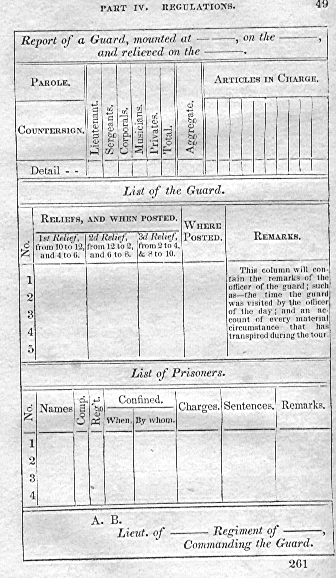

PART IV. REGULATIONS.
The officer of the day, immediately after being relieved, will add to the guard report such remarks as circumstances require, and present the same at head quarters.
An officer is not to be placed in charge of a guard, till he sufficiently acquainted with his duty. For the purpose of instruction, young officers are to be put on duty as supernumeraries, with senior officers, from whose advice and experience they may be expected to obtain a knowledge of their duty.
ORDER OF ENCAMPMENT.
Infantry.- (See PLATE 1.)
The troops are on all occasions to be encamped in the order of battle.
The front of the camp will occupy the same extent of ground, as the troops when drawn up in line, according to their established formation. The intervals between the battalions will be forty-four feet.
The companies will encamp in streets, perpendicular the line; one-half of the tents on each side of the streets, facing inwards. The width of the streets will depend on the strength of the companies. The distance between each tent will be two feet; the distance between the tents of one company and those of another, four feet.
Thus, a regiment of six hundred men will occupy a front of six hundred feet each, allowing for each file two feet. This front will be divided as follows:- First, deduct forty feet for the main street leading through the centre of camp to the Colonel’s or commanding officer’s marquee; there will then remain five hundred and sixty feet, to be divided among the companies on either side of the main street; and if there be ten of them, each company will be allowed a front of fifty-six feet.
The following will be the dimensions of a camp for a regiment of six hundred men.
Front, . . . . . . . . . . . . . . . . . . . . . . . . . . . . . 600 feet.
Depth, . . . . . . . . . . . . . . . . . . . . . . . . . . . . . 810 feet.
Feet.
From the front of the line of company-tents to the
Chain-sentinels of the first line . . . . . . . . . . . . . . . . . . 500

PART IV. REGULATIONS.
This space to subdivided as follows: . . . . . . . . . . . . . .Feet.
From the front line of company-tents to the stacks
of arms, drums, and colours, . . . . . . . . . . . . . . . . . . . . .20
Thence to the regimental parade, . . . . . . . . . . . . . . . . . . . 60
Thence to the sinks of the men, . . . . . . . . . . . . . . . . . . . . .320
Thence to the front of the officer of the guard’s tent, . . . . 60
Thence to the chain of sentinels, . . . . . . . . . . . . . . . . . . . . 40
____
From the first line of company-tents to the front of
the company officers’ tents, . . . . . . . . . . . . . . . . . . . ... 140
____
This space to be subdivided as follows:
From the front of the company officers’ tents to the
company kitchens, . . . . . . . . . . . . . . . . . . . . . . . . . . . ... 40
Thence to the kitchens of the officers and tents of
sutlers, . . . . . . . . . . . . . . . . . . . . . . . . . . . . . . . . . . . . ..... 40
Thence to batmans’ tents, . . . . . . . . . . . . . . . . . . . . . . ... . . 16
Thence to horses and baggage-wagons, . . . . . . . . . . . . . 20
Thence to officers’ sinks, . . . . . . . . . . . . . . . . . . . . . . . . . . 30
Thence to the quarter-guard, . . . . . . . . . . . . . . . . . . . . . . .12
Thence to the chain of sentinels, . . . . . . . . . . . . . . . . . . .. 12
____
The tents of all the officers will face towards the front; those of the Captains will be placed on a prolongation of the right flanks of the companies, and those of the subalterns on a prolongation of the line of the left flanks; the Colonel’s or commanding officers’ marquee in the centre of the main street; the Lieutenant-Colonel’s opposite to the centre of the right wing; the Major’s opposite to the centre of the wing; the Adjutant half-way between the Colonel and Lieutenant-Colonel; the Surgeon half-way between the Colonel and Major; the Quartermaster on the right of the Lieutenant-Colonel, half-way between his position and the flank; the Assistant-Surgeon on the left of the Major, half-way between his position and the flank.
The non-commissioned staff to be encamped on the prolongation of the lines of tents, and in a line with the company

PART IV. REGULATIONS.
kitchens, on each side of the main street, facing from the street.
The Sergeants of companies to occupy a tent on the right of their companies, in the front line. The Corporals to be distributed among their respective squads.
The company kitchens will be placed, those of the right wing, on a line with the right of the companies; those of the left wing, on a line with the left of the companies.
The sinks will always be hid from public view, by encircling them with bushes or other blinds; a portion of the earth dug out of them ought every day be thrown in to cover the filth, should the troops remain encamped on the same ground any length of time.
When the army encamps in two lines, the second line will be formed eight hundred feet in rear of the first.
The camp-guards of the second line will be the same distance in the rear that they are in front, in the first line; and also the sinks of the men.
Cavalry.-(See PLATE 2.)
The cavalry will encamp by squadrons, each squadron occupying the same front that it does when drawn up in the order of battle, with then same intervals being preserved between the squadrons.
Two companies constitute a squadron. Each company of a squadron pitches its tents in one row perpendicularly to the front, facing inwards. The horses of each company are picketed in a line parallel to the tents, with their heads towards them. Each horse, so picketed, will require about five feet; the depth of the row will depend on the number of horses in the company. The tents will pitched at equal distances from each other, so as to allow space between them respectively, for the forage of the horses belonging to the men of the respective tents. The tents of the Sergeants will always be pitched at the head of the row, and on the line of encampment. The distance between the Sergeant’s tent and the adjacent tent, will be double the distance between the other tents, so as to allow for the forage of the Sergeants’ horses, and those of the men in the next tent, and this rendering it unnecessary to place the forage of the last tent in the row on the side of the kitchens, where it is exposed to fire.

PART IV. REGULATIONS.
Each company of sixty mounted dragoons, will occupy a front of ninety feet, which will be divided as follows;
Feet.
For pitching a horseman’s tent, . . . . . . . . . . . . . . . . 9
From front poll of tents to pickets, . . . . . . . . . . . . . 12
From pickets to the edge of the dung, . . . . . . . . . . .18
Breadth of the dung, . . . . . . . . . . . . . . . . . . . . . . . . 6
A squadron of two companies will occupy a front of 180 feet, so that there will be between the dung of each company, a street of 90 feet.
If a company encamp by itself, it will observe the same rule, except that it will be formed in two rows of tents, instead of one.
If there be an odd company in a squadron, or with the regiment, it will encamp in the same manner as is directed for the other companies of the squadron; that is, in one row, and facing towards the company next to it, whether it be on the right or the left, preserving a distance equal to its front when in line.
The horses of the rear-rank are always to be picketed next to their file-leaders.
The horses of company officers are to be picketed in a line with the company horses, on the flank towards the officers’ tents’.
The non-commissioned staff will encamp in a line the field and staff.
The horses of the field and staff are to be picketed in the rear of their respective tents.
The remainder of the encampment, including guards, baggage, sutlers, kitchens, batmen, and sinks, will conform to that of the infantry.
Artillery.-(See PLATES 1 and 2.)
The artillery will encamp in such positions as may be selected by the commander of the troops to which it may be attached, who will always take into consideration the protection proper to be afforded from the line, as well as the facility with which it may get into position, in case of an attack; but batteries which form a part of the order of battle, will encamp upon the same line with the troops. Mounted artillery will encamp according to the order for cavalry, and foot-artillery according the order for the infantry.

PART IV. REGULATIONS.
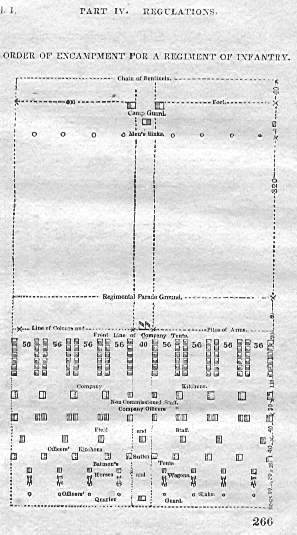

PART IV. REGULATIONS.
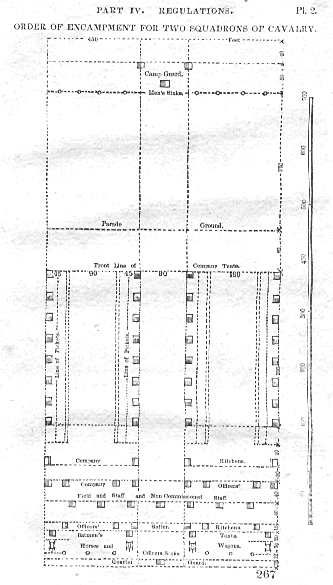

PART IV. REGULATIONS.
HONOURS TO BE PAID BY THE TROOPS.
The President is to be saluted with the highest honours- all standards and colours dropping, officers saluting, drums beating, and trumpets sounding.
The same compliments will be paid to the Vice-President.
A Major-General commanding in chief, is to be received- by cavalry, with swords drawn, trumpets sounding the march, and all the officers saluting, standards dropping- by infantry, with drums beating the march, colours dropping, officers saluting, and arms presented.
A Brigadier-General is to be received- by cavalry, with swords drawn, trumpets sounding twice the trumpet flourish, and officers saluting- by infantry, with two ruffles, colours dropping, officers saluting, and arms presented.
An Adjutant-General or Inspector-General, if under the rank of a general officer, is to be received at a review, or inspection of the troops under arms- by cavalry, with swords drawn, officers saluting- by infantry officers saluting and arms presented. The same honours to be paid to any field officer, authorized to review and inspect the troops. When the inspecting officer is junior in rank to the officer on the parade, and in command of the troops to be inspected, no compliments will be paid; he will be received with only swords drawn and arms shouldered.
All guards are to turn out and present arms to general officers as often as they pass them, except the personal guards of general officers, which turn out only to the Generals whose guards they are, and to officers of superior rank.
To Colonels, the guards of their own regiments turn out, and present arms once a day; after which they turn out with shouldered arms.
To Lieutenant-Colonels and Majors, their own guards turn out with shouldered arms, once a day; at other times, with ordered arms.
When the command of a regiment devolves on a Lieutenant-Colonel or Major, the regimental guards will pay him the same compliment as is ordered for the Colonel.

PART IV. REGULATIONS.
To the Secretary of State, Treasury, War, and Navy Departments, and other members of the Cabinet; to the Chief Justice, the President pro tempore of the Senate, and Speaker of the House of Representatives of the United States, and to Governors, within their respective States and Territories- the same honours will be paid as are specified for a Major-General commanding in chief.
The colours of a regiment passing a guard, are to be saluted with the utmost respect, the trumpets sounding, and the drums beating a march.
When two regiments meet on their march, the regiment inferior in rank is to halt, and form in parade order, and salute the other regiment, which proceeds on its march, with swords drawn and bayonets fixed, trumpets sounding or drums beating, standards or colours flying, until it has cleared the front of the regiment which has halted.
When guards present their arms, the officers, on all occasions, salute with their swords.
When general officers, or persons entitled to a salute, pass guards while in the act of relieving, both guards are to salute, receiving the word of command from the senior officer of the whole.
All guards are to be under arms when armed parties approach their posts; and to parties commanded by commissioned officers, they are to present their arms, drums beating a march, and officers saluting.
Sentinels will present arms to all general and field officers, and to the officer of the day; to all other officers they will carry arms.
No compliments by guards or sentinels will be paid between retreat and reveille, except as prescribed for grand rounds.
Sergeants, with swords drawn, will salute by bringing them to a recover- with muskets, by bringing the left hand across the body, so as to strike the musket near the right shoulder. Corporals out of the ranks will carry their muskets at a shoulder, as Sergeants, and salute in like manner.
When a soldier without arms, or with side arms only

PART IV. REGULATIONS.
meets on officer, he will continue to move on, but he is to raise his hand to his cap, looking at the same time in a respectful and soldier like manner at the officer, who will make a suitable acknowledgement to the compliment thus received.
Salutes.
The President of the United States alone is to receive the national salute.
The national salute is determined by the number of States composing the Union, at the rate of one gun for each State.
The Vice-President is to receive a salute of twenty-one guns.
The Heads of the great Executive Departments of the National Government; the Major-General commanding the army; the Governors of States and Territories, within their respective jurisdictions- seventeen guns.
A Major-General, fifteen guns.
A Brigadier-General, thirteen guns.
A general officer will be saluted but once a year at each post, and only when notice of his intention to visit the post has been given.
Salutes to individuals are to be fired on their arrival only.
A national salute will be fired at meridian, on the anniver-sary of the Independence of the United States, at each military post and camp.
Escorts of Honour.
Escorts of honour may be composed of cavalry or infantry, or both, according to circumstances. They are guards of honour, for the purpose of receiving and escorting personages of high rank, civil or military. The troops for this purpose will be selected for their soldierly appearance and superior discipline, and the duty must always be considered as one of high distinction.
The manner of receiving and escorting the personage is as follows:
The escort will be drawn up in line, the centre opposite to the place where the personage presents himself, with an interval between the wings to receive the personage and his retinue. On his appearance, he will be received with the honours due to his rank. When he has taken his place in the line, the whole will be wheeled into platoons or companies,

PART IV. REGULATIONS.
as the case may be, and take up the march. The same ceremony will be observed, and the same honours paid, on his leaving the escort.
When the position of the escort is at a considerable distance from the point where the personage is expected to be received, as for instance, where a court-yard or wharf intervenes, a double line of sentinels will be posted from that point to the escort, facing inwards, and the sentinels will successively salute as the personage passes.
An officer will be appointed to attend the personage escorted, to bear such communications as he may have to make to the commander of the escort.
Funeral Honours.
On the receipt of official intelligence of the death of the President of the United States, at any post or camp, the commanding officer shall, on the following day, cause a gun to be fired at every half-hour, beginning at sunrise and ending at sunset, When posts are contiguous, the firing will take place at the post only commanded by the superior officer.
On the day of the interment of a Major-General commanding in chief, shall consist of a regiment of infantry, a squadron of cavalry, and six pieces of artillery,
That of a Major-General, a regiment of infantry, a squadron of cavalry, and four pieces of artillery.
That of a Brigadier-General, a regiment of infantry, one company of cavalry, and two pieces of artillery.
That of a Colonel, a regiment.
That of a Lieutenant-Colonel, six companies.
That of a Major, four companies.
That of a Captain, one company.
That of a Subaltern, half a company.
The funeral escort shall always be commanded by an officer of the same rank with the deceased; or if none such be present, by one of the next inferior grade.
The funeral escort of a non-commissioned staff officer shall consist of sixteen rank and file, commanded by a Sergeant.

PART IV. REGULATIONS.
That of a Sergeant, of fourteen rank and file, commanded by a Sergeant.
That of a Corporal, of twelve rank and file, commanded by a Corporal.
The escort will be formed in two ranks, opposite to the quarters of the deceased, with shouldered arms, and bayonets fixed; the artillery and cavalry on the right side of the infantry.
On the appearance of the corpse, the officer commanding will command- present-arms; when the honours due to the deceased will be paid by the drums and trumpets. The music will then play an appropriate air, and the coffin will be taken to the right, where it will be halted. The commander will next order- Shoulder-arms. By company (or platoon)- left wheel- march. Column-forward, guide right- march.
The column will be marched, in common time, to appropriate music; and, on reaching the grave, will take a direction so as that the guides shall be next to the grave. When the centre of the column is opposite the grave, the commander will order- Column- halt. Right into line- wheel- march.
The coffin is then brought along the front, and the commander then orders- Present-arms; and when the coffin reaches the grave, he adds- Shoulder-arms. Order-arms. Rest.
After the funeral service is performed, and the coffin is lowered into the grave, the commander will order- Attention. Shoulder-arms. Load in quickest time. Load:-when three rounds of small arms will be fired by the escort, taking care to elevate the pieces.
This being done, the commander will order- By company (or platoon) right wheel- march. Column forward, guide left, quick-march.
The music will not begin to play until the escort is clear of the enclosure or burying-ground.
COLOUR ESCORT.
When a battalion turns out under arms, and the colour is wanted, one of the flank companies in its turn, or if both be

PART IV. REGULATIONS.
absent, a battalion company, other than that of the colour, will be put in march to receive and escort the colour.
The march will be in the following order, in quick time, and without music;- the drum-major and field-music, followed by the band; the escort in column, by platoon, right in front, with arms shifted to the right shoulder, and the colour-bearer between the platoons.
Arrived at front of the tent or quarters of the Colonel, the escort will form line, the field-music and band on the right, and arms will be carried.
The moment the escort shall be in line, the colour-bearer, preceded by the first lieutenant, and followed by a sergeant of the escort, will go to receive the colour.
When the colour-bearer shall come out, followed by the lieutenant and sergeant, he will halt before the entrance; the escort will present arms, and the drums will beat to the colour for half a minute, when arms will be shouldered and the escort will break into column by platoon; the colour-bearer will place himself between the platoons, and the lieutenant and sergeant will resume their posts.
The escort will march back to the battalion to the sound of music, in quick time, and in the same order as above.
Arrived at the distance of twenty paces from the battalion, the escort will halt, and the music cease; the Colonel will place himself six paces before the centre of the battalion, the colour-bearer will approach the Colonel, by the front, in quick time; when at the distance of ten paces, he will halt; the Colonel will cause arms to be presented, and to the colour to be played, which being executed, the colour-bearer will take his place in the front-rank of the colour-guard, and the battalion, by command , will shoulder arms.
The escort, field-music, and band, will return in quick time to their several places in the line of battle, marching by the rear of the battalion.
The colour will be escorted back to the Colonel’s tent or quarters, in the above order.
REVIEW.
A battalion being in the order of battle, the Colonel will command- BATTALION, PREPARE FOR REVIEW. TO THE REAR OPEN ORDER- MARCH

PART IV. REGULATIONS.
At the word march, the field and staff officers dismount; the company officers and the colour-rank advance four paces in front of the first rank, and place themselves opposite to their respective places in the order of battle; the staff officers place themselves on the right of the rank of company officers, according to their relative rank, one pace from each other; the music advances through the centre, and forms in two ranks- the band, if there be one, in front, between the colours and the line; the colour-guard replace the colour-rank; the Quartermaster-Sergeant and the Sergeant-Major on the right of the front-rank of the battalion.
When the ranks are aligned, the Colonel will command- FRONT, and place himself eight paces, the Lieutenant-Colonel and Major two paces, in front of the rank of company officers, and opposite to their respective places in order of battle.
A camp colour is to be originally placed eighty or one hundred paces in front of the centre of the battalion, where the reviewing officer is supposed to take his station; and although he may choose to quit that position, still the colour is to be considered as the point to which all movements and formations are relative.
When the reviewing officer presents himself before the centre, and is fifty or sixty paces distant, the Colonel will command- PRESENT-ARMS. The men present arms, and the officers salute, so as to drop their swords with the last motion of presented arms; the music will play, and all the drums will beat, according to the rank of the reviewing officer. The colours only salute such persons as, from their rank and by regulation, are entitled to that honour.
The Colonel will next command- SHOULDER-ARMS, when the men will shoulder, and the officers recover their swords with the last motion.
The reviewing officer will then go towards the right, the whole remaining perfectly steady, without paying further compliment, while he passes along the front of the battalion, and proceeds round the left flank and along the rear to the right. When the reviewing officer is going round the battalion, the band will play, and will cease when he has returned to the right flank of the battalion.
While the reviewing officer is proceeding to place himself in the front, the Colonel will command- CLOSE ORDER_

PART IV. REGULATIONS.
MARCH, when all persons, except the Colonel, will resume their places in the order of battle; the field and stall officers mounted.
The reviewing officer having taken his position near the camp colour, the colonel will command-BY COMPANY RIGHT WHEEL- MARCH. PASS IN REVIEW. COLUMN, FORWARD, GUIDE RIGHT- MARCH. The battalion will break into column of companies, right in front, and the column will be put in motion; the Lieutenant-Colonel on a line with the leading company, the Major on a line with the rear company; the Adjutant on a line with the second company; the Sergeant-Major on a line with the company next to the rear; each six paces from the flank opposite to the reviewing officer; the staff officers in one rank, according to the order of precedency, four paces in rear of the column; the music, preceded by the principal musician, six paces before the colonel; the pioneers, preceded by a Corporal, four paces before the principal musician; and the Quartermaster-Sergeant two paces from the side opposite to the guides, and in a line with the pioneers.
All other officers and non-commissioned officers will march in the places prescribed for them in the march of an open column.
The guides and soldiers will keep their heads well to the front in passing in review.
The colour-bearer will remain in the ranks while passing and saluting.
Points will be fixed by the Adjutant for the several wheelings of the division; so that their right flanks, in marching past, shall be only four paces distant from the camp colour, where it is supposed that the reviewing officer places himself to receive the salute.
The column will march past in common time, with closed ranks.
The music will begin to play just after the leading company has made the second wheel; it will wheel to the left out of the column, and take a position opposite to, and facing, the reviewing officer, and will continue to play until the rear of the column shall have passed him, when it will cease to play and follow in the rear of the battalion.
The officers will salute the reviewing officer when they

PART IV. REGULATIONS.
Arrive within six paces of him, and recover their swords when ten paces past him, without in the least altering the rate of march. All officers in saluting will cast their eyes towards the reviewing officer. The Colonel, when he has saluted at the head of the battalion, will place himself near the reviewing officer, and will remain there until the rear has passed, when he will rejoin the battalion.
The colour will salute the reviewing officer when within six paces of him. When the colour salutes, the drums will pay the prescribed compliment.
When the rear of the column has passed the reviewing officer, the Colonel will command- GUIDE LEFT.
The column will proceed on the alignment until it shall have arrived at the point where its head or right is to be placed, when the Colonel will command- COLUMN, HALT. LEFT INTO LINE WHEEL- MARCH. It will then be wheeled into line, and placed in the order of battle.
When the line shall have been formed, the Colonel will cause the battalion to perform such exercises and maneuvres as may be required by the reviewing officer.
The review will terminate by bringing the troops into line opposite to the reviewing officer, ranks opened, and the whole saluting as at the beginning.
When two or more battalions are to be reviewed, they will be formed in parade order, with the prescribed intervals, and will perform the same movements that are laid down for a single battalion, observing the additional directions that are given for such movements when applied to the line. The Brigadier two paces in front of the rank of Colonels; his aid on his right, one pace retired; and the other brigade staff officers, those having the rank of field officers, in the rank of Lieutenant Colonels and Majors; and those below that rank, in the rank of company officers.
In passing in review, a Major-General will be four paces in front of the Colonel of the leading battalion of his division; and the Brigadiers will be on the right of the Colonels of the leading battalions of their brigades; staff officers on the left of their Generals.
Upon occasions when the line exceeds two battalions, the reviewing officer may, at his option, cause them to march

PART IV. REGULATIONS.
past in quick time, in order to save time. Upon these occasions the mounted officers only will salute.
A number of companies less than a battalion, will be reviewed as a battalion; and a single company, as if it were with the battalion. In the latter case, the company will pass in column of platoons, according to the order of the reviewing officer.
The review of cavalry or artillery, mounted, or with pieces, will be conducted on the same principles, allowing for the difference of organization, and the words of command appropriate to the respective arms.
INSPECTION.
The inspection of the troops will generally be preceded by a review. The present example embraces a battalion of infantry. The inspecting officer and the field and staff officers will be on foot.
The battalion being in the order of battle, the Colonel will cause it to break into open column of companies, right in front. He will next order the ranks to be opened, when the colour-rank and colour-guard will take post ten paces in front, and the band ten paces in rear of the column.
The Colonel, seeing the ranks aligned, will command- OFFICERS AND NON-COMMISSIONED OFFICERS, TO THE FRONT OF YOUR COMPANIES- MARCH. The officers will from themselves in one rank, eight paces, and the non-commissioned officers in one rank, six paces, in advance, along the whole fronts of their respective companies, from right to left, in the order of seniority, the pioneers and music of each company in one rank, two paces behind the non-commissioned officers.
The Colonel will next command- FIELD AND STAFF. TO THE FRONT- MARCH. The commissioned officers thus designated, will form themselves in one rank, six paces in front of the colours, from right to left, in the order of seniority; and the non-commissioned staff, in a similar manner, two paces in rear of the preceding rank. The Colonel, seeing the movement executed, will take post on the right of the Lieutenant-Colonel, and wait the approach of the inspecting officer.
The inspection will commence in front. After inspecting the dress and general appearance of the field and commissioned staff under arms, the Inspector, accompanied by these

PART IV. REGULATIONS.
officers, will pass down the open column, looking at every rank in front and rear.
The Colonel will now command- ORDER ARMS. REST; when the Inspector will proceed to make a minute inspection of the several ranks or divisions, in succession, commencing in front.
As the Inspector approaches the non-commissioned staff, colour-rank. The colour-guard, and the band, the Adjutant will give the necessary orders for the inspection of arms, boxes, and knapsacks. The colours will be planted firm in the ground, to enable the colour-bearers to display the contents of their knapsacks. The non-commissioned staff may be dismissed as soon as inspected; but the colour-rank and colour-guard will remain until the colours are to be escorted to the place from which they were taken.
As the Inspector successively approaches the companies, the Captains will command- attention, inspection of arms. The Inspector will go through the whole company, commencing with the non-commissioned officers. The Captain will then command- open- boxes; when they will also be inspected.
The Captain will next command- Stack-arms. To the rear, open order- march. Front rank, about- face. Unsling-knapsacks. Open knapsacks. The arms of the non-commissioned will be stacked in the centre of their rank.
The knapsacks will be placed at the feet of the men, the flaps from them, with the great-coats on the flaps, and the knapsacks leaning on the great-coats. In this position, the Inspector will examine the contents of the whole, or of as many as he may think necessary, commencing with the non-commissioned officers.
As the Inspector passes the companies, they will successively, under the orders of their respective Captains, repack and resling knapsacks, resume their arms, and file off to their tents or quarters; except the company that is to re-escort the colours, which will wait the further orders of the Colonel.
In an extensive column, some of the rearmost companies may, after the inspection of dress and general appearance, be permitted to stack arms, until just before the Inspector
PART IV. REGULATIONS.
approaches them, when they will be directed to take arms, and resume their positions.
The inspection of the troops being ended, the field and staff will next accompany the inspector to the hospital, magazine, arsenal, quarters, sutler’s shop, guard-house, and such other places as he may think proper to inspect. The Captains and subalterns will precede him in his visits to their companies and sections respectively.
The men will be formed in the company quarters in front of their respective bunks, and on the entrance of the inspector the word attention will be given by the senior non-commissioned officer present, when the whole will salute with the hand, without uncovering.
The Inspector will examine the general arrangement of the interior of the quarters, the bunks and bedding, cooking and table utensils, and such other objects as may present themselves; and afterwards the exterior.
The Adjutant will exhibit to the Inspector the regimental books and papers, including those relating to the transactions of the council of administration. The company books and papers will also be exhibited, the whole together, generally at the Adjutant’s office, and in presence of all the officers not otherwise particularly employed.
Inspections, similar to those embraced in this article, will be made monthly, and as much oftener as may be deemed necessary by the commanders of regiments and posts. Captains will do the like on every Saturday morning, and Lieutenants of sections on every Wednesday morning, each in regard to his company or section respectively. Surgeons will also make a thorough inspection of their hospitals every Saturday morning.
Besides these inspections, frequent visits will be made daily to the quarters of their men and patients, by company officers and Surgeons; and the Colonel or other commander will make frequent general visits in the course of the month, to the men’s quarters, the hospital, the guard-house, and the like.
The muster of the troops for payment, will be preceded by an inspection.
The inspection of cavalry and artillery will conform to the principles laid down for the infantry, regard being had to the words of command appropriate to the respective arms.

PART IV. REGULATIONS.
CALLING OUT THE MILITIA FOR THE SERVICE
OF THE UNITED STATES.
Whenever detachments of militia are called into the service of the United States, by any officer authorized to make that call, the number of officers, non-commissioned officers, and privates, will be stated in the requisition, and the proportions between them will be the same as is prescribed by the act of Congress. Requisitions will never be made for companies, regiments, or brigades,
Such detachments as are called or received into the service of the United States, will be mustered, before they shall be considered in service, by an Inspector-General, or some other officer of the regular army, to be designated by the officer requiring such militia aid.
It shall be the duty of the officer designated, to muster and inspect militia detachments, to organize them into companies, battalions, and regiments, and to forward muster-rolls of each company, and off the field and staff of each organized regiment, direct to the Adjutant-General of the army, Washington; and he will also immediately forward a consolidated return, by regiments and corps, of the force so received into service, for the information of the War Department.
Officers charged with the duty of mustering militia, properly ordered into the service of the United States, preparatory to payment, will take care that the muster rolls contain all the information that may in any way effect their pay; the distance from the places of residence to the place of rendezvous or organization, and the date of arrival, must be stated in each case, the date and place of discharge, and the distance thence to the place of residence; all stoppages for articles furnished by the government, must be noted on the rolls, and in cases of absence at the time of discharge of the company, the cause of absence must be stated. When the necessary information cannot be obtained, the mustering officer will state the cause, otherwise he will be held accountable for the defect.
No general staff officers will be mustered or received into service, except such general officers, with their aides-de-camp, as may be required to complete the organization of brigades or divisions, where the strength of the detachments renders such organization necessary.

PART IV. REGULATIONS.
All supernumerary officers will be rejected, and the organization of each detachment will correspond with the acts of Congress regulating the militia.
Payments will, on all cases, be made by the Paymasters of the regular army, and only upon rolls which shall have previously been submitted to the Paymaster-General, and found by him to be in conformity with law, and the regulations of the department.
MANNER OF ISSUING AND DISTRIBUTING ORDERS.
Orders Are either general or special. General orders, issued from the head quarters of the army, are styled General Orders- from the other head quarters they are simply styled orders. They are the orders of the day, and are published as often as circumstances may render it necessary, They are announce the orderly hours at head quarters; the time and places of the distribution of supplies; the time and order of march; the hours of the different beats and signals, of guard mounting, and of the assembling of detachments; the regulations of police; the strength and composition of guards, and the periods of their relief; the number and grades of Orderlies; the appointing of general courts martial, courts of inquiry, boards of officers, and their sentences and opinions; the commendations, or animadversions which the conduct of the troops may elicit, as well as exhortations suitable to particular occasions; and, in general, every occurrence proper to be communicated to the troops or others interested.
Special orders, are such orders as do not relate to the service in general. They have reference to particular objects and individuals only. They need not, therefore, be published to the whole army, or the whole command of the officer who issues them. Besides the particular individual to whom such orders may be sent direct, they are, however, to be communicated, as a matter of course, to Colonels, or other commanders whom they interest.
Orders are to be numbered- general orders, in one series- special orders in another. Each series for an army, army corps, division, or brigade, in the field, will commence and terminate with a campaign. In departments, regiments,

PART IV. REGULATIONS.
companies, and garrisons, they will commence and terminate with the year.
The parole, and countersign, or watchword, are issued from the head quarters of the highest in command. They are in the nature of orders, but are neither general nor special.
The parole is imparted to such officers only, as have a right to visit the guards, and to make the grand rounds; and to the officers commanding guards, by which they are enabled, at night, to recognize the grand rounds. No person under the rank of commissioned officer, is entitled to receive it.
The countersign, or watchword, is given to such persons as are entitled to pass and repass during the night, and to the officers, non-commissioned officers, and sentinels of the guards. The object of this word is to prevent improper persons, or those not authorized to pass the chain of sentinels, from either entering or going out of camp or garrison, and to guard against surprise.
The head of the order will indicate the source from which it emanates, as well as the place and date, and the foot of the order will cite the name of the commander who gives the order.
The orderly hour having been fixed at each head quarters, the staff officers will either attend in person, or send their assistants to obtain the orders of the day: the chief of the staff for an army corps, to general head quarters; the chief of staff of a brigade, to division head quarters: the Adjutant of a regiment, to brigade headquarters: the First Sergeants of companies, to regimental head quarters.
For more complete information on 19th Century Military Drill, visit the main page.